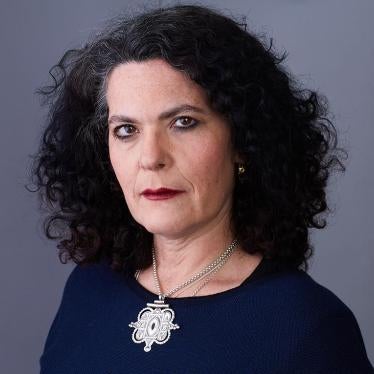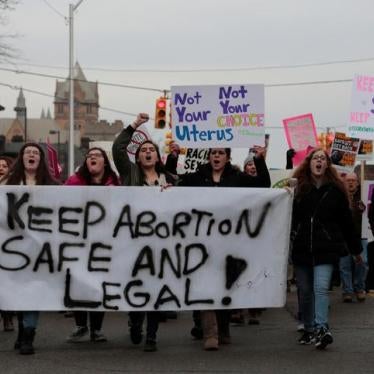Abortion is illegal in South Korea. But women are demanding change. More than 235,000 people signed a petition, posted on September 30 on the presidential office website, that calls for the government to legalize abortion. And that should include access to mifepristone, an abortion-inducing drug available in many countries around the world.
The government allows members of the public to post a petition on its website for 30 days. In August, the new government of president Moon Jae-In pledged to formally respond within 30 days to any petition that gathers more than 200,000 signatures.
On November 26, the government responded by buying time.
In a 10-minute video, Cho Kuk, the senior presidential secretary of civil affairs, discussed the current restrictions on abortion and mentioned future legal reforms, referring to a constitutional challenge to the country's abortion laws by a doctor accused of performing illegal abortion. The case is expected to be heard in 2018.
Cho pledged that the government would develop a better sexual education program for teenagers, and provide more support for single mothers and adoptive families. But on abortion he said the government needs updated data to decide how to proceed, such as the number of abortions taking place and women's reasons for seeking abortion, he promised the government will collect new data in 2018.
He described the issue as “sensitive” saying government will use the term “interruption of pregnancy” rather than “abortion.”
If euphemisms are helpful, so be it. But the call for more data smacks of delaying tactics. Some things are already perfectly clear.
Today in South Korea, women may only legally obtain an abortion in highly restricted circumstances. An abortion is possible in cases of rape or incest, if the parents cannot marry legally, if continuation of the pregnancy is likely to jeopardize the pregnant woman's health, or when the pregnant woman or her spouse has one of a limited number of designated hereditary disorders or communicable diseases.
Married women need their spouse's permission for an abortion, and any abortion, regardless of motivation or context, is prohibited after 24 weeks of pregnancy.
Current South Korean law punishes a woman who has an illegal abortion with up to one year in prison or fines up to 2 million won ($1,820). Healthcare workers who provide abortions face up to two years in prison.
Despite these restrictions, abortion is widely available in South Korea, and prosecutions for abortion are rare. But in recent years there has been growing tension over the issue, and abortion foes have pushed for tougher enforcement.
Abortion is still a sensitive issue in South Korea, which struggles with the consequences of a falling birthrate and rapidly aging population. But it is also clear that when governments restrict abortion, women still have abortions — they just have more dangerous ones.
According to the U.N., in 2011 the average unsafe abortion rate was more than four times greater in countries with restrictive abortion policies than in countries with liberal abortion policies.
Measures such as enhanced access to prenatal and obstetric care, generous parental leave for both women and men, equality and lack of stigma for single and unmarried parents and their children, free or subsidized child care, and improved access to high quality free education for children could both help promote gender equality and make it easier for South Koreans to choose to become parents.
President Moon has taken several important steps to improve women's rights. He made a campaign promise to have a Cabinet that is at least 30 percent women — and kept that promise.
In another positive step, the government recently pledged to strengthen its law on workplace sexual harassment. So he is off to a good start, and he should now lead a comprehensive effort to reform laws and policies to increase gender equality. There is a lot to fix.
South Korea still has serious problems with discrimination, harassment and violence against women. It was recently ranked an abysmal 116 out of 144 countries when it came to gender equality. Footage recently emerged of nurses at a hospital allegedly forced to dance in skimpy outfits for visiting officials. In a recent survey, 80 percent of South Korean men said they had physically or psychologically abused a girlfriend.
The country also has the unhappy distinction of having the third-highest proportion, at 52.5 percent, of female murder victims in the world — a fact attributed to murder of women by intimate partners and the government's failures to effectively enforce laws against domestic violence.
A 2015 survey by the government found that more than 78 percent of sexual harassment victims in the workplace did not seek recourse but rather "put up with it." Many women said they did not believe they would get help if they complained.
The government's sex education guidelines have also been criticized; an indication of just how inappropriate the guidelines are is their suggestion, intended for high-school teachers, that women may risk rape if they go on dates with men who pay for an expensive meal and who may expect sex in return.
With its 235,000 signatures, the petition to legalize abortion is a key test of the depth of President Moon's commitment to women's rights. The petition places the issue squarely in his lap. Some might argue the government's willingness to discuss the issue and the pledge for future steps are positive signs.
But every day of delay is another day in which South Korean women are forced to risk their health to make reproductive choices that should be their right. Presidential secretary Cho and his government have already heard from hundreds of thousands of South Koreans who think that's the sensitive issue.
President Moon and his government should act now to introduce and pass legislation to fully decriminalize abortion. South Korea should remove all penalties for women who seek abortion, and for medical providers of abortions, and abolish the requirement that wives obtain their husband's consent before they can access abortion.
There is a long road ahead if South Korea is to treat women equally.
|
Commentary
Demanding Access to Abortion in South Korea
235,000 Petitioners Call for South Korean Government to Act
Published in:
Korea Times
Your tax deductible gift can help stop human rights violations and save lives around the world.
Region / Country
Topic
Most Viewed
-
December 15, 2025
Lebanon: Israel Unlawfully Destroying Reconstruction Equipment

-
November 25, 2025
Nigeria: Renewed Spate of School Kidnappings

-
November 25, 2019
A Dirty Investment

-
November 25, 2024
Haiti: Scarce Protection as Sexual Violence Escalates
-
September 20, 2017
Iraq/KRG: 1,400 Women, Children From ISIS Areas Detained





